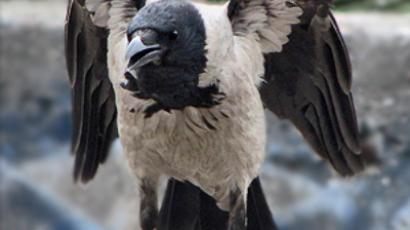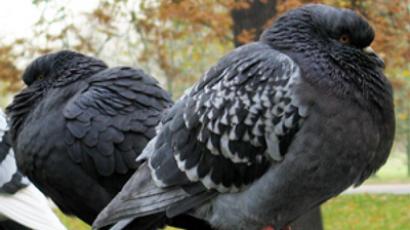'Zombie pigeon epidemic’ in Moscow sparks fears of transmission to humans

An “epidemic” of pigeon deaths in Moscow has sparked speculation that birds were succumbing to a virus dangerous to human beings. People who came across sick birds paying no attention to cars or passersby described them as "zombie pigeons."
On Wednesday the Federal Veterinary and Phytosanitary Inspection Service reported that the birds’ abnormal behavior was caused by the so-called “Newcastle disease,” which can spread to humans.
Moscow's Veterinary Committee said the mass death of pigeons in the capital was due to salmonellа poisoning, an intestinal infection spread among animals and humans. Veterinary specialists detected lesions on the gastrointestinal tracts and livers of the dead birds caused by salmonella, not Newcastle disease, Interfax reported.
Autopsies of dead birds showed that they had all suffered from a common intestinal infection that is not dangerous to humans, said Moscow's deputy mayor for social issues, Leonid Pechatnikov. Neither the bird flu, dangerous to humans, nor fowl plague or any other diseases threatening people have been found, he said.

Gennady Onishchenko, Russia's chief sanitary inspector, said that while the word “epidemic” was often used in the press, he doubted it could described as one. However, he warned that parents should take care if their children could come into contact with sick birds.
"We are especially worried about children's playgrounds... And if a dead bird is found on the balcony, it must be washed with disinfectant. Doing this, one must be wearing rubber gloves," Onishchenko said.
Although the birds' salmonella is not harmful to humans, direct contact with the sick birds should be avoided, veterinarians said.
"The disease poses no risk for humans, provided standard precautions of personal hygiene are observed and direct contact with sick birds is avoided. Activators of avian influenza and psittacosis (an infection that can be transmitted to humans) have not been identified," the committee said.
Salmonella infections in humans usually resolve in 5-7 days, but a small number of persons with Salmonella develop pain in their joints, irritation of the eyes and painful urination. The so-called Reiter's syndrome can last for months or years, and can lead to chronic arthritis.
Newcastle disease, which is transmissible to humans, can cause mild conjunctivitis and influenza-like symptoms.
Ornithologists say that the so-called "epidemic" occurs every year, and not only in Moscow. “Most often, it begins in August. This is due to the fact that the breeding season is over, young birds come out with reduced immunity, and they are more susceptible to all infectious diseases,” ornithologist Natalia Anisimova told Russia’s TV Dozhd (Rain).















